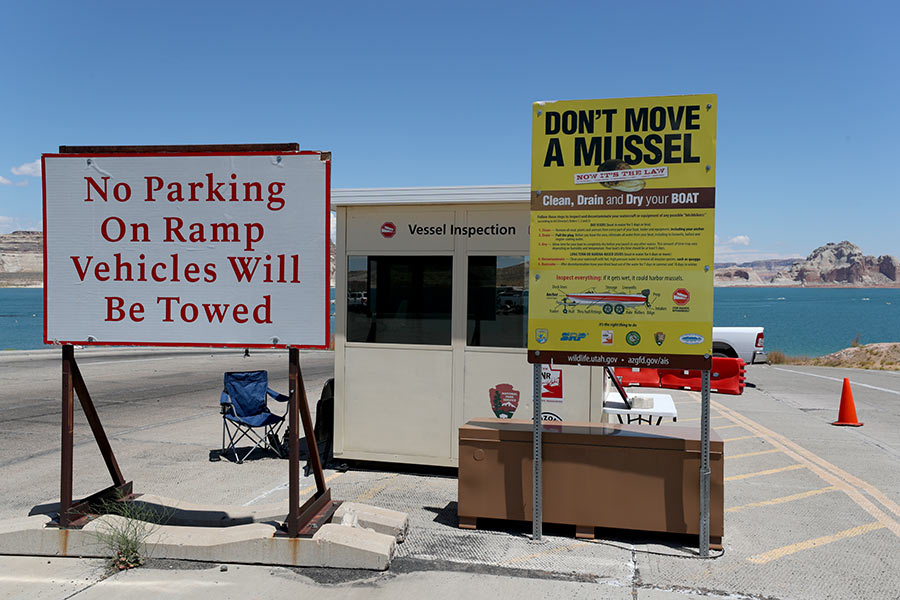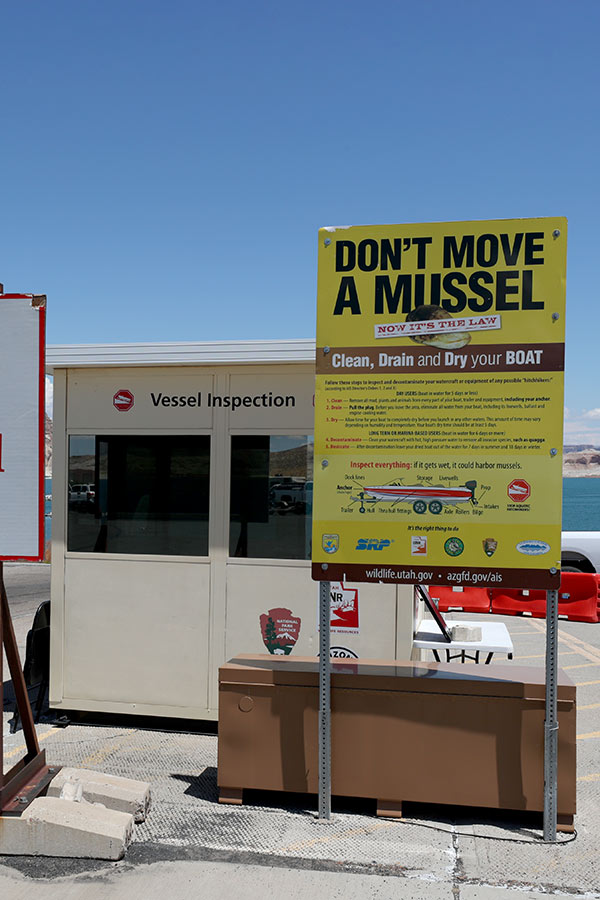Over 18K boats inspected for quagga mussels during Fourth of July weekend
Salt Lake City — Law enforcement officers and technicians with the Utah Division of Wildlife Resources and other agencies had a busy Fourth of July weekend, working to inspect and decontaminate boats across the state. Their efforts focused on preventing the invasive quagga mussels in Lake Powell and in other states from spreading to other Utah waterbodies.
Statewide, Aquatic Invasive Species technicians with the DWR, Utah State Parks, Arizona Game and Fish Department and the National Park Service inspected 18,831 boats and performed 364 decontaminations from Thursday to Sunday.
Statewide, DWR conservation officers issued 161 citations and warnings for violations of Utah laws established to prevent the spread of invasive mussels. The majority of the violations this year were due to:
- Boaters and others with watercraft not stopping at an inspection station
- Boaters failing to take the mandatory mussel-aware boater program course and not paying the associated aquatic invasive species fee
- Boaters failing to remove drain plugs while transporting their watercraft
- Boaters illegally launching without waiting the required dry time or getting a decontamination
DWR officers also detected a boater at Strawberry Reservoir who was attempting to transport his boat with the livewell full of water and live fish. In Utah, it is illegal to move live fish from one waterbody to another or to take them home, and can result in a class A misdemeanor. Illegal fish introductions are a huge concern for transporting disease and can also ruin a fishery and threaten the species in the waterbody.
"Thank you to all the boaters who work with our staff and are cooperative in preventing the spread of aquatic invasive species," DWR Aquatic Invasive Species Lt. Bruce Johnson said. "We appreciate the effort and time boaters take to comply with laws to protect our waters in Utah. Visit the STD of the Sea website for all the details about the mandatory education course, how to receive your required aquatic invasive species decal, and to learn all the rules for watercraft inspections and decontaminations."
As a reminder:
- Anyone who launches a boat or any other watercraft in Utah — whether they are a resident or nonresident — is first required to take a free annual mussel-aware boater course. This includes individuals with paddleboards, kayaks and other nonmotorized watercraft.
- Anyone who wants to launch a motorized boat in Utah must also pay the annual aquatic invasive species program vessel enrollment fee. (After you pay the fee, a current-year boat decal will be mailed to you.) To reiterate, this is not a new fee or an additional fee for boaters — it just separates the payment into two different payments. The aquatic invasive species fee is $20 per watercraft for residents and $25 per watercraft for nonresidents. If you have paid the aquatic invasive species program vessel enrollment fee but have not received the decal yet, you can simply show proof of payment on your phone or with a printed receipt to be in compliance.
- All watercraft leaving Lake Powell — currently the only Utah waterbody with confirmed quagga mussels — are required to have an exit inspection during the inspection station's hours of operation. Inspections are not the same as decontaminations. After a watercraft is inspected, it must still be professionally decontaminated before that watercraft can launch at a different waterbody. If a decontamination can't be performed, the watercraft must follow the recommended cleaning and draining guidelines, and wait the required dry time before launching again.
- When leaving any waterbody and when transporting watercraft, all drain plugs must be removed. Boaters should also remove any sea strainers while transporting their watercraft.
There are over 40 inspection stations located at various waterbody boat ramps, along highways and at Port of Entry stations throughout Utah. Visit the STD of the Sea website for a list of all the decontamination stations around the state and for further information regarding requirements for boaters and others using nonmotorized watercraft.
Why quagga mussels are bad
- They plug water lines, even lines that are large in diameter.
- If they get into water delivery systems in Utah, it will cost millions of dollars annually to remove them and keep the pipes free, which can result in higher utility bills.
- They remove plankton from the water, which hurts fish species in Utah.
- Mussels get into your boat's engine cooling system. Once they do, they'll foul the system and damage the engine.
- When mussels die in large numbers, they stink and the sharp shells of dead mussels also cut your feet as you walk along the beaches.


















